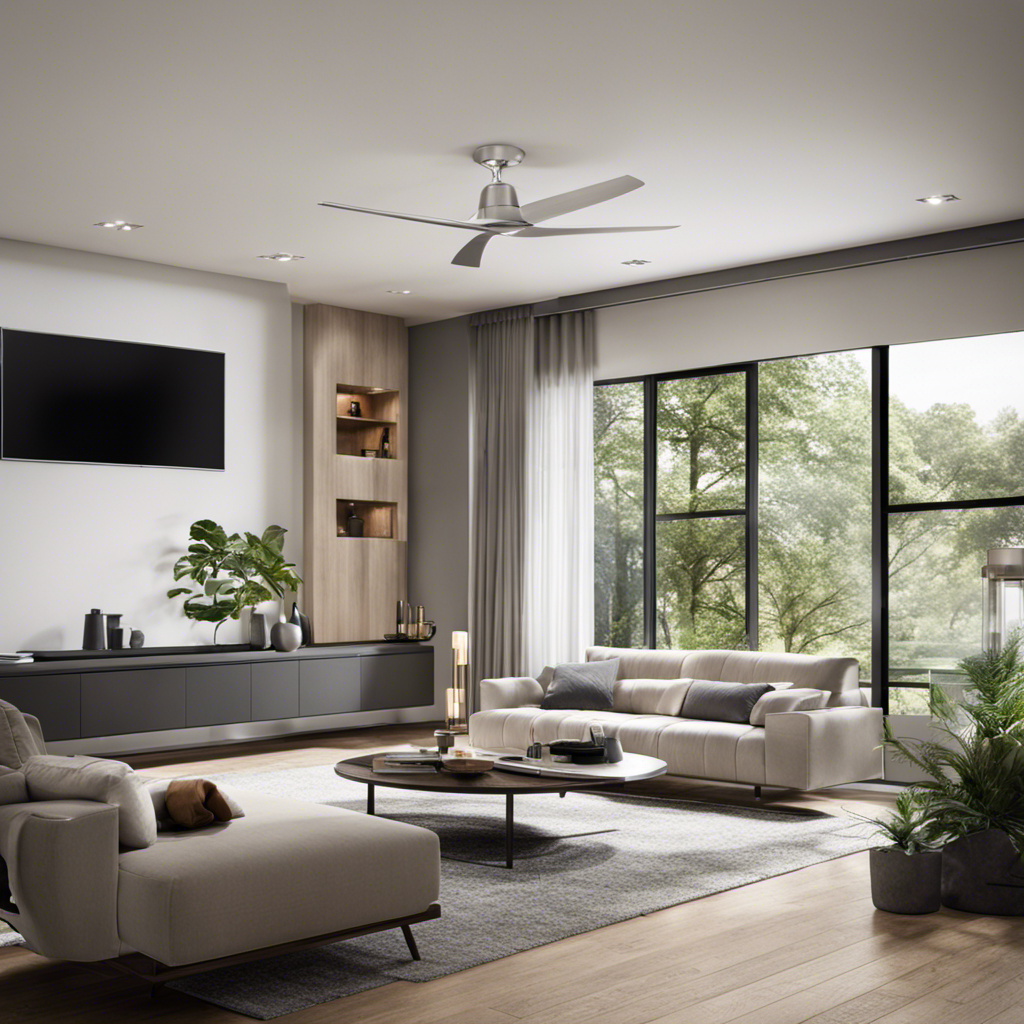In today’s world, energy efficiency has become a paramount concern for homeowners. When it comes to HVAC systems, finding the most efficient option is crucial for both comfort and cost savings.
This article aims to provide insights into the different types of HVAC systems available and the factors to consider when choosing one that maximizes energy efficiency. By understanding SEER and Energy Star ratings, as well as implementing optimization tips, homeowners can make informed decisions that serve their needs while reducing their environmental impact.
Key Takeaways
- The most efficient HVAC system for a home can provide reduced energy consumption, lower energy bills, improved indoor air quality, and consistent temperatures and humidity levels.
- There are several types of HVAC systems to consider, such as ductless (mini-split) systems, central HVAC systems, geothermal heat pumps, and air source heat pumps. The choice should be based on factors like climate, budget, and energy efficiency.
- When choosing an efficient HVAC system, factors to consider include the size of the home, energy-saving technology, cost effectiveness, energy efficiency ratings, and the overall value as a wise investment for your home.
- Understanding SEER and Energy Star ratings is important. SEER measures cooling efficiency, while Energy Star certification signifies energy efficiency. These ratings can help in evaluating the effectiveness of an HVAC system.
The Importance of Energy Efficiency in HVAC Systems
The importance of energy efficiency in HVAC systems cannot be overstated. As individuals and businesses strive to reduce their carbon footprint and conserve energy, energy-saving tips and techniques become essential. Energy-efficient HVAC systems offer numerous benefits, both for the environment and for the individuals using them.
One of the primary benefits of energy-efficient HVAC systems is reduced energy consumption. These systems are designed to use less energy while still providing optimal heating, ventilation, and air conditioning. By utilizing advanced technologies such as variable-speed motors and smart thermostats, energy-efficient HVAC systems can adjust their output based on the actual needs of the space, resulting in lower energy bills.
Furthermore, energy-efficient HVAC systems contribute to a healthier indoor environment. By properly filtering and dehumidifying the air, these systems improve indoor air quality, reducing the risk of respiratory issues and allergies. Additionally, they help maintain consistent temperatures and humidity levels, creating a more comfortable and productive environment.
Comparing Different Types of HVAC Systems
When evaluating HVAC systems for a home, it is important to compare the various types available to determine the most suitable option.
Two common types of HVAC systems are ductless and central systems. Ductless systems, also known as mini-split systems, consist of an outdoor unit and one or more indoor units. These systems are ideal for homes without existing ductwork, as they provide individualized temperature control for different zones.
On the other hand, central HVAC systems use a network of ducts to distribute heated or cooled air throughout the home.
Another important comparison is between geothermal and air source heat pumps. Geothermal heat pumps use the stable temperature of the ground to provide efficient heating and cooling, while air source heat pumps extract heat from the outdoor air.
Both options have their advantages and it is important to consider factors such as climate, budget, and energy efficiency when making a decision.
Factors to Consider When Choosing an Efficient HVAC System
One important factor to consider when choosing an efficient HVAC system is the size of the home. It is crucial to select a system that can adequately heat or cool the entire space without wasting energy.
Energy-saving technology is another key consideration. Look for HVAC systems that are equipped with features such as programmable thermostats, variable speed motors, and zoning capabilities. These technologies help optimize energy usage and reduce utility bills.
Additionally, cost effectiveness is an important factor to consider. While it may be tempting to choose the cheapest HVAC system available, it is essential to consider the long-term costs. Look for systems with high energy efficiency ratings and a track record of reliability to ensure that you are making a wise investment for your home.
Understanding SEER and Energy Star Ratings for HVAC Systems
An important aspect to consider when evaluating the efficiency of HVAC systems for a home is the understanding of SEER (Seasonal Energy Efficiency Ratio) and Energy Star ratings.
SEER is a metric used to measure the cooling efficiency of an air conditioner or heat pump, while Energy Star is a certification program that signifies energy efficiency.
SEER ratings are calculated by dividing the cooling output of an air conditioner or heat pump by the amount of energy it consumes in a cooling season. EER (Energy Efficiency Ratio), on the other hand, measures the efficiency of an HVAC system at a specific temperature.
Energy Star certification indicates that a product meets or exceeds the energy efficiency standards set by the Environmental Protection Agency. The benefits of Energy Star certification include lower energy consumption, reduced utility bills, and a smaller carbon footprint.
Tips for Optimizing the Efficiency of Your HVAC System
Maximizing the efficiency of your HVAC system requires implementing proper maintenance and regular cleaning.
One important tip for optimizing your HVAC system’s efficiency is to improve insulation in your home. By ensuring that your home is well-insulated, you can prevent air leaks and minimize heat transfer, allowing your HVAC system to work more efficiently.
Another crucial tip is to schedule regular maintenance for your HVAC system. Regular maintenance, such as cleaning or replacing air filters, checking refrigerant levels, and inspecting ductwork, can help keep your system running smoothly and efficiently.
It is also important to have a professional technician perform annual tune-ups to identify any potential issues and make necessary adjustments.
Frequently Asked Questions
How Often Should I Have My HVAC System Inspected and Maintained to Ensure Its Efficiency?
Regular inspections and maintenance are essential to ensure the efficiency of your HVAC system. By identifying and addressing any issues promptly, you can improve its efficiency without the need for replacement. Look for signs like higher energy bills or uneven temperature distribution.
Are There Any Government Incentives or Rebates Available for Installing an Energy-Efficient HVAC System?
There are government incentives and rebates available for installing energy-efficient HVAC systems, which can help homeowners save on energy costs. These incentives aim to promote energy conservation and encourage the use of sustainable heating and cooling solutions.
Can I Install an Energy-Efficient HVAC System in an Older Home, or Does It Only Work for New Constructions?
Installing an energy-efficient HVAC system in an older home is possible but may pose challenges due to the existing infrastructure. However, the benefits, such as reduced energy consumption and cost savings, make it a worthwhile investment. Different energy-efficient HVAC system options are available for various home types.
What Are the Potential Cost Savings Associated With Upgrading to a More Efficient HVAC System?
Upgrading to a more efficient HVAC system in a home can yield potential energy savings and a favorable return on investment. The cost savings come from reduced energy consumption and lower utility bills.
Are There Any Specific Maintenance Tasks or Cleaning Procedures That I Should Perform Regularly to Maintain the Efficiency of My HVAC System?
Regular maintenance tasks and cleaning procedures are essential to maintaining the efficiency of your HVAC system. These include cleaning or replacing air filters, inspecting and cleaning coils, checking and lubricating fan motors, and scheduling professional maintenance services.


